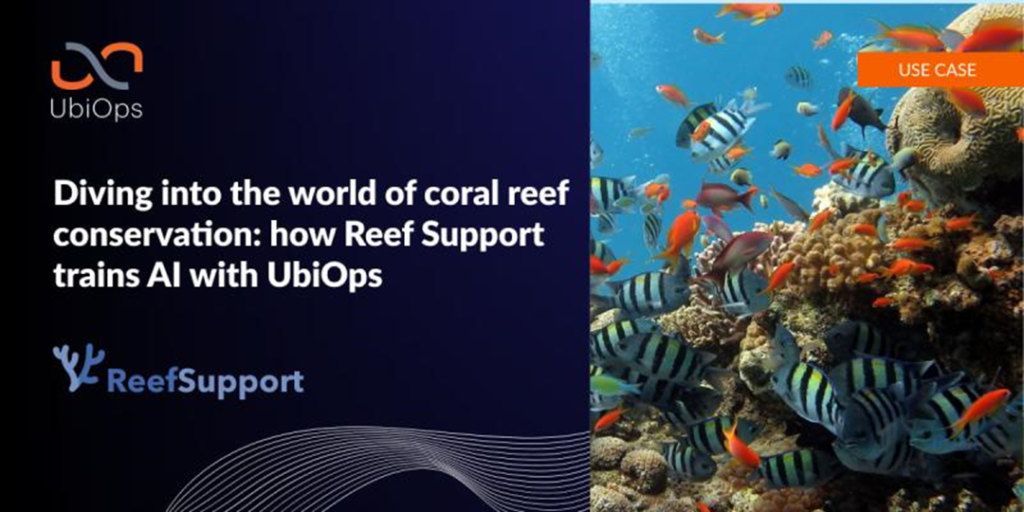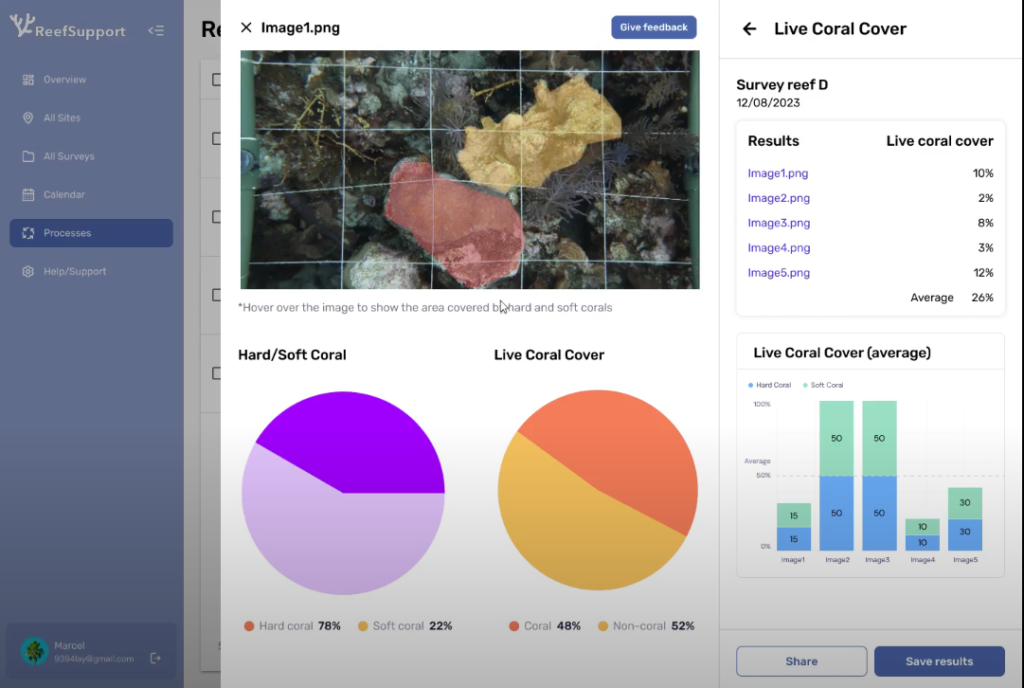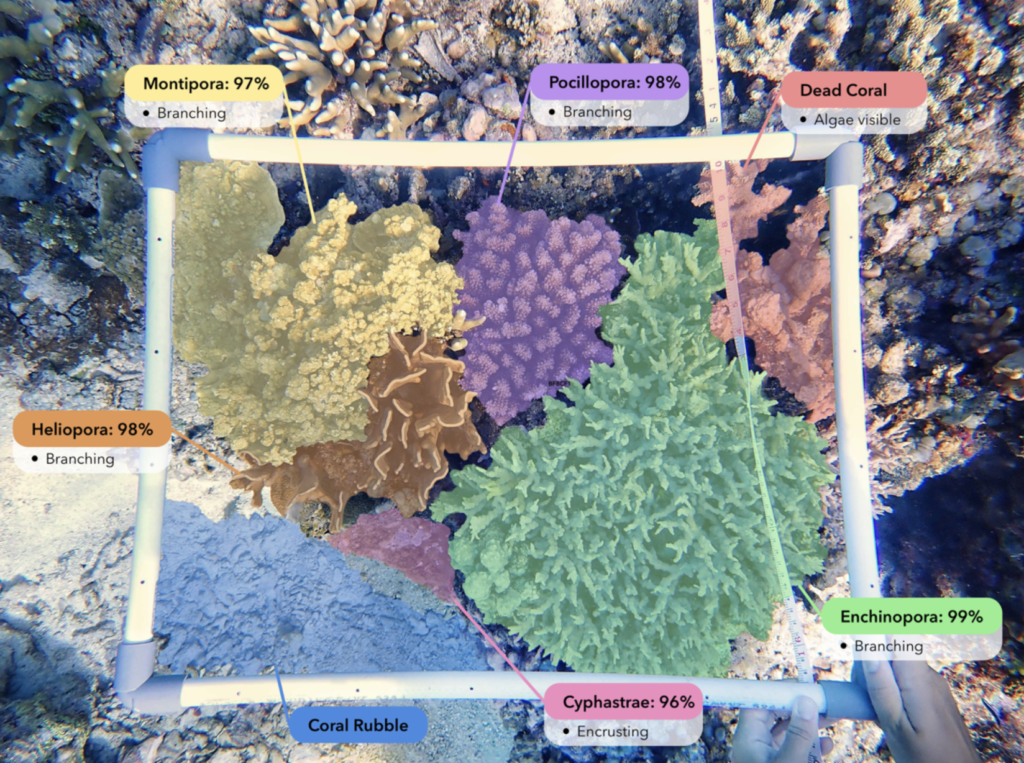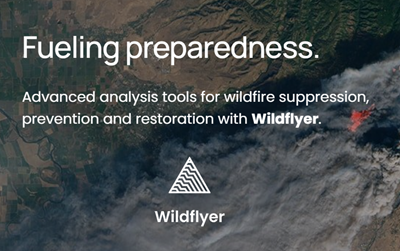Reef Support is focused on helping marine biologists in their task of researching and improving the health of coral reefs by using satellite data and artificial intelligence (AI). With a small team and a fast pace, the startup – currently incubated at ESA BIC Noordwijk – needs an efficient tool to deploy and train their AI and machine learning (ML) models. The team finds everything that’s needed and more in the UbiOps platform. Let’s dive into their story and experiences in this case study.

Reef Support dives into the world of coral reef conservation
Founded by Marcel Kempers (CEO) and Yohan Runhaar (CTO), Reef Support’s application Open Coral AI automatically analyses data gathered by marine conservation organisations. Marine biologists monitor and improve the health of coral reefs, mainly in marine protected areas. Although the specific procedures differ, they usually start with regular dives to take photos and measurements.
Once above the surface, a lot of manual work awaits them, from lab work to creating reports. Yohan explains: “Artificial Intelligence can be a massive help in the daily activities of marine biologists. Creating the reports takes a lot of time and effort. Using our solution will give marine biologists more time to analyse and advise on the health and protection of coral reefs.”
The right AI/ML deployment platform
Initially, the startup used one of the platforms of a cloud provider on a startup credit plan. “It was a valuable platform to train and test our prototype and we received a credit package for startups, which was very economically attractive,” says Yohan. “However, the platform was very complex.” It proved very time-consuming to understand how the platform worked, to make adjustments, and to plan training to enhance their models.
They bumped into several challenges with the previous tool. For instance, the platform was very complex and, therefore, took a lot of time to figure out how to use it – and you know what they say: time is money.
Yohan explains: “The tool we used has so many options that you need a bigger team and much time to figure out the best way. But startups are small, and we want to develop our products quickly. That is why we started looking for an alternative machine learning operations (MLOps) deploying tool. There was one catch: we wanted to keep using the credits we had already acquired, but we couldn’t use them just anywhere. And then we found UbiOps.”

Transferring cloud credits
One of the requirements of Reef Support was to bring their cloud credits. Luckily, integrating UbiOps with cloud providers is a simple process. Single-tenant or custom node pool installations are simple to set up. Companies can carry on using their own cloud credits and only consume them when a model is active – whether on a CPU or a GPU.
They can also automatically scale up to use UbiOps’ multi-cloud compute resources to handle traffic spikes if a boost is needed. This can save businesses like Reef Support from getting locked into a single provider. Yohan explains: “Being able to bring our credits was very important to us.”
Ease of use
When it comes to deploying and managing AI and ML applications, data scientists often need the support of engineers with specific expertise. Yohan says: “UbiOps exceeded our expectations. We are a small team with non-technical colleagues, and they also understand and work in UbiOps. The documentation was clear and we needed minimal support from UbiOps to get started.”
When starting to work with UbiOps, Reef Support faced another big challenge: they had a deadline to put their model online within 3 weeks. “It was a big risk for us to switch platforms with this deadline, but I was certain we would make it with UbiOps,” he continues. “Now, I’m glad we took the risk. We had only weeks to implement the model and our model was running within just 5 days. It was beyond expectations and we were delighted.”

Currently, they run multiple versions of a deployed model in UbiOps. Still in the proof-of-concept phase, this is especially useful for Reef Support because it simplifies experimentation. Yohan notes: “It’s so fast and effortless that our workdays look different now. We often use the version selection feature because different versions are running for different pilots. It opened many doors for us with potential customers because we can tailor to their needs with this feature.”
Next steps with UbiOps
Reef Support is currently focused on finishing its proof of concept. It will then consolidate its findings into a model ready for more extensive use. Yohan summarises: “I would recommend UbiOps for startups. We could use our existing credits, and the tool is so simple and efficient that we are much more advanced with our product timewise than anticipated. Speediness is very important for our startup, as is being able to manage our models with a minimum of employees. UbiOps helps tremendously with our daily activities and our mission to enhance the health of coral reefs.”
This is an edited version of the case study that appears on the UbiOps website.
Related:
Technical partner UbiOps offers support for machine learning operations
Reef Support solves problems under water that are affecting billions


